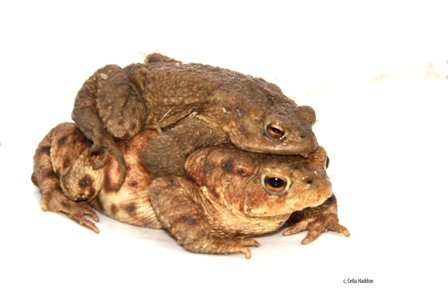Toad rescue
11th September 2013
British journalist and author, Celia Haddon talks about her toad rescuing exploits

Dusk falls. The deer move out of the bushes to graze in the field across the way, the rabbits come out to play, and Caspar the village Bengal cat goes hunting up the road verges. Only the local buses and cars disturb the peace with their lights and roaring engines.
It is a tiny yelping noise that tells me that the toads, like the deer, are moving out of the bushes at the top of the hill. Slowly, they crawl down through the fields and the gardens, seeking their native pond, as they have done for thousands of years.
One of modern life’s realities, however, is evident in the busy road that lies between them and their pond. Several squashed bodies of these amphibians are a sign that this ancient mating journey is now threatened as never before.
Luckily for the toads, Matthew and Harriet who live in the village come out with buckets to help them cross in safety. I am one of several volunteers who are part of their team.
I wear gloves so that my hands do not hurt their cold-blooded amphibian skin with my warm blooded mammalian heat. I carry a torch so that I can see them in vegetation – and also for safety so that the relentless traffic sees me. Once I have spotted a toad, I pick it up, put it in my bucket, and place it through the barbed wire on the other side of the road where they can crawl across the final field to their pond.
We see them laboriously crawling down the road trying to find a gap in the fence where they can get through to the pond. Or they appear in the middle of the road, helpless in the glare of headlights. Most pathetic are the large fat female toads, slow and weighed down with eggs.
Some already have a sex-mad small male clamped on their backs. This embrace is the amplexus, whereby the male positions himself so that when the female reaches the pond he can eject the sperm on her eggs before any other male gets to her.
In my area frogs usually mate before the toads, so that mis-matings do not occur – though I have seen a witless frog purring away for a mate surrounded by toads yelping. The two species cannot interbreed so this difference in timing is Nature’s way of preventing useless effort.
Patrolling this small Cotswold village from about 5pm onwards until complete darkness falls, is inspirational for me. Across the field, yelps from the pond tell of group sex, an explosive orgy in which the males scramble to dislodge their competitors and a female may be weighted down by the sheer number of males attached to her body.
The curtains of the cottages are drawn tight. Men and women withdraw and nature moves into the space they leave. Silence falls with the dusk and I think how lucky I am to be alive and part of nature.
Tell us your stories: info@freshwaterhabitats.org.uk
